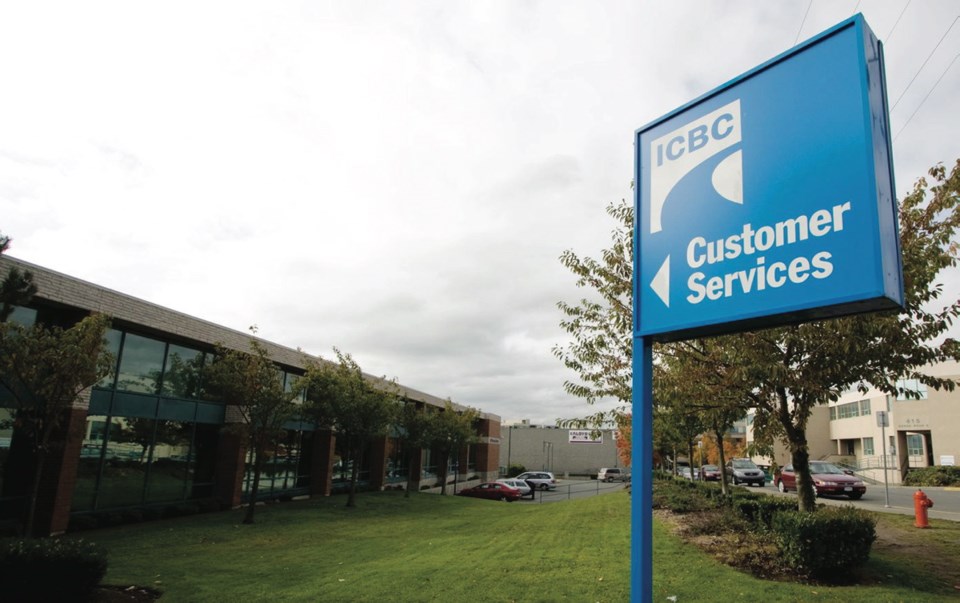B.C. drivers are paying considerably more for comparable automobile insurance than their neighbours in Alberta, according to a new study commissioned by private insurers.
But the figures are misleading, argues the B.C. government, because they fail to acknowledge the pressures and realities on auto insurance in both provinces.
Consulting firm MNP examined rates that B.C. drivers will pay after the province changes the insurance system this year and compared those rates to what drivers pay in Alberta’s private insurance market.
It concluded that B.C.’s new insurance system will offer similar coverage as Alberta, but be more expensive.
“While the two systems will be substantially similar, drivers in B.C. will pay significantly more for similar coverage,” according to the report.
On April 1, B.C. will put a $5,500 cap on pain and suffering claims for minor injuries in vehicle crashes. It will recalculate premiums for all B.C. drivers based on a new risk model in September. Rates will also rise 6.5 per cent on April 1.
The changes are an attempt to deal with $2.5 billion in losses at the Insurance Corp. of B.C. over two years.
The report by MNP took those reforms into account.
It found, for example, that a 55-year-old Vancouver woman with a 29-year driving record that had one at-fault accident five years ago, who commutes to work in a 2016 Toyota Camry, will pay $2,096 in auto insurance under B.C.’s new insurance model this year — $697 more than similar insurance in Calgary.
A 24-year-old Vancouver man, with one at-fault crash five years ago and who commutes to work in a 2010 Ford F-150 pickup truck, will pay $3,292 in insurance in B.C., roughly $1,083 more than the lowest rate in Calgary, the report said.
A 26-year-old woman from Burnaby with a clean eight-year driving record, who commutes to work in a 2014 Honda Civic, would pay $2,567, or $893 more than the lowest rate in Calgary, the report said.
A Langley family with two 45-year-old parents who have clean driving records, along with a 16-year-old with a learner’s licence, would pay $2,332 for auto insurance for their 2012 Honda Accord, or $937 more than the lowest private rate in Edmonton, according to MNP.
ICBC will have new fees and risk levels for allowing learners to use family vehicles starting in September.
The study was commissioned by the Insurance Bureau of Canada, which has argued provinces like Alberta that allow private companies to compete on insurance offer better deals than the Insurance Corp. of British Columbia’s monopoly on basic rates.
“When they pulled all these quotes, they found drivers in B.C. — no matter who you are — you were paying potentially hundreds of dollars more in premiums for auto insurance in B.C. for substantially the same coverage,” said Aaron Sutherland, the bureau’s pacific vice-president. “The big difference is who sells you auto insurance. ICBC is a monopoly, where Alberta is a private sector where drivers have choice.”
Attorney General David Eby said the figures are misleading because they don’t acknowledge that private insurance companies have called the situation in Alberta a “crisis” and are refusing to insure 40 per cent of Albertans because they represent too much risk.
Private insurers are also fighting Alberta’s cap on auto rate hikes.
“I just cannot believe that the private insurers, at the same time they are aggressively lobbying for higher rates in Alberta, pulling business out of Alberta and refusing to provide insurance to Albertans, that they are saying that’s the model they want to bring to British Columbia,” Eby said.
Eby said the cost comparisons “depend on the metrics you use, and you can torque it one way or the other.”
ICBC also disputed the report.
“No private insurer could come into B.C. and offer the rates they offer in Alberta — our system and the cost pressures are very different — and the levels of coverage provided to British Columbians far outweigh those in other provinces,” the corporation said in a statement.
“As of April 1, for example, our medical care benefits will be six times those offered in Alberta, our wage-loss [coverage] will be almost double and our death benefits triple.”



